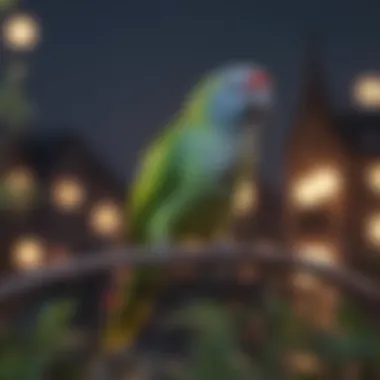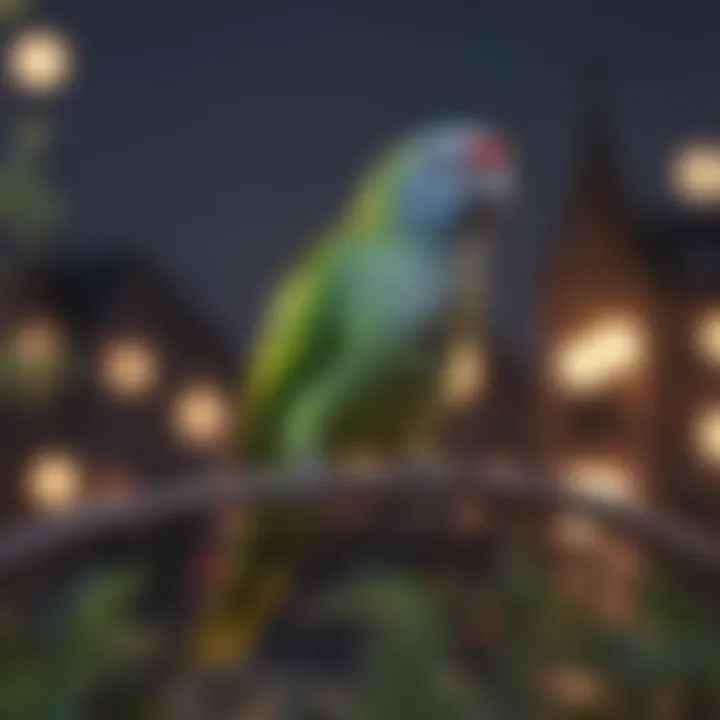Understanding Nocturnal Behavior in Pet Birds


Intro
Pet birds are fascinating creatures, and understanding their behaviors can greatly enhance the relationships we share with them. One specific behavior that sparks interest is nocturnal chirping. Many bird owners wonder why their feathered friends chirp at night, what drives this instinct, and how it impacts the bird's environment as well as the owner’s comfort. This article will navigate through the various aspects of avian nocturnal behavior, including environmental influences and the unique needs of different bird species. Brining awareness to these factors can aid owners in promoting a peaceful and harmonious atmosphere for their pets.
Avian Care Basics
Understanding how to take care of pet birds starts with basic knowledge about their needs. Neglecting the foundation of proper care often leads to stress or discomfort in birds.
Importance of Proper Nutrition
Nutrition plays a crucial role in a bird's general well-being. A balanced diet includes a mix of pellets, seeds, fruits, and vegetables. Each bird species has unique dietary needs. For instance, cockatiels thrive on a different food composition compared to parakeets. Providing a well-rounded diet not only keeps birds healthy but also less prone to unnatural behaviors, including those at night, indicating stress or discomfort.
Understanding Bird Species and Their Needs
Every bird species comes with its distinct habits and requirements. Understanding these differences helps owners to regulate their pets' environments accordingly. For example, tropical birds might be more inclined to chirp or vocalize due to their instinctual behaviors that relate to their natural habitats. Researching specific birds ensures that the communication through these night-time sounds is decoded correctly and addressed appropriately.
Basics of Birds Habitat Setup
Creating a suitable habitat is foundational. A bird's habitat should mimic their natural environment—offering adequate space, safe perches, and stimulation to keep them healthy. Environmental stressors, such as inadequate darkness during nighttime, can lead to increased vocalizations. This aspect directly relates to nighttime chirping, as a lack of a proper day-night cycle may confuse the bird.
Grooming and Hygiene Tips
Lastly, regular grooming is essential. Not only does it help maintain aesthetic appearance, but importantly it keeps feathers in top shape. Failing in grooming can lead to discomfort and agitation, possibly causing nighttime disturbances, including excessive chirping. Bathing birds periodically ensures they are clean and happy—so consider including this in regular care.
Interacting with Your Pet Bird
Successful interaction with pet birds lays groundwork for building long-standing relationships and easing any nighttime disturbances.
Building Trust and Connection
Establishing trust is critical. Birds need to feel safe around their owners. Gentle handling, soft talking, and consistent interaction helps birds build confidence. When they experience that connection during the day, they may express better tranquility at night, limiting unnecessary chirping.
Training Techniques and Tips
Training birds to respond to commands can encourage better behavior. Reinforement techniques play a significant role. Offering positive reinforcement when they remain still and calm during the night can train birds to be more settled as night falls.
Fun Activities for Bird Owners and Their Birds
Engaging in daily play is an excellent way to bond. Toys exlusively designed for birds, such as platforms and chewing toys, feed their instinctual need for activity and socialization; hence reducing nighttime noise levels due to stress.
Recognizing Bird Cues and Behaviors
It's equally vital to be observant of your bird's behaviors. Understanding chirping patterns during day-night transitions aids in identifying any distress, letting owners tap into that unspoken language for insights into their emotional state.
A keen observer understands that nocturnal chirping may signify discomfort or a need for attention in birds.
Emotional Well-Being of Birds
Concern for emotional wellness cannot be understated when managing nighttime chirping.
The Role of Play and Socialization
Exposing a bird to regular forms of play, plus extending socialization beyond their habitat, contributes positively to their well-being, likely diminishing nighttime vocalizations.
Enhancing Birds' Emotional Health
Allocating time to foster habits of emotional engagement and direct communication greatly assists in counteracting stress. Speaking consistently and understandingly calms disturbed birds and steadies others during the night.
Assessing Bird Stress and Remedies
Monitoring birds for signs of stress builds awareness about when intervention is necessary. Some signs include vocalizations during irregular hours, pacing, and losing interest in regular activities. These stress signs can signal a signal that require an owner’s attention or possible modification in routine.
Building Strong Human-Bird Bonds
Lastly, nurturing those bonds through shared activities fosters trust and security, allowing nighttime interactions to become routine behaviors rather than sources of stress.
Bird Health and Safety
Understanding a bird's health and safety directly affects vocalization patterns, particularly at night.
Common Health Issues and Prevention
Visiting a vet for preventive health checks aids in minimizing potential health problems. Since health-related woes can result in anxiety, ensuring a bird's health impacts overall contentment.
Routine Veterinary Care


Regular check-ups assure that potential issues are mitigated, reinforcing tranquil habits and possibly reducing the likelihood of disturbances during the night.
Environmental Hazards to Avoid
Be cautious of hazards around your bird's environment. Potential dangers like smoke, fumes, or small objects detrimental to a bird's safety can raise agitation levels and prompt nocturnal behavior indicating enviromenal sk stress.
Signs of Illness or Distress
Observing behaviors that deviate significantly from the norm can signal both illness and distress leading to unusual nighttime calls.
Fun Facts and Quirky Insights
Possessing knowledge about your bird's unique attributes reinforces connections and sets a foundational behavior insight—warding off unneeded chirping.
Unique Traits of Popular Bird Species
Certain birds, like African grey parrots, are known for vocal prowess which carries over into their nocturnal activity—making it vital for owners to understand how and why species-specific traits cause distinct nighttime behaviors.
Audiogazing into a pet bird’s world of impressions presents exploration. An inadvertent learning to regard distractions provides insight into improving evening dynamics. With so fringed an understanding, the chirps of unique habit create further contemplation even in the quiet peace of midnight.
Fully embracing such insight leads change—ensuring delightful bonds in front of orangesomes into opportunities regarding monocultural habits. Maintaining inspiration and applying understanding provides vital companionship leading into fruitful moments even as nighttime attention flourishes.
Prolusion to Bird Vocalization
Understanding bird vocalization is vital in appreciating the complexity of avian behavior, especially regarding pet birds. Vocal sounds are not merely random acts; they serve several essential purposes. These sounds contribute significantly to inter-bird communication, aid in territorial defense, signify mating readiness, and even indicate distress. By familiarizing pet owners with how and why birds vocalize, they can better anticipate and respond to their pets' needs. This awareness can enhance the bond between birds and their owners and promote a more harmonious living environment.
Bird vocalization is a compelling topic for those who own or wish to acquire pet birds. Observing and understanding these sounds can shed light on underlying emotions, health status, and social dynamics in the household. An informed approach allows pet owners to engage effectively with their birds and create an appropriate habitat for individual vocalization patterns.
The Importance of Vocalization in Birds
Birds are vocal creatures, employing sound to convey various messages. Vocalization is crucial for several reasons:
- Social Interaction: Birds use calls and songs to engage with companions, coordinating social activities and establishing bonds within flocks.
- Mating Signals: Many birds engage in intricate song patterns to attract mates, showcasing genetic fitness and species identity.
- Territorial Claims: Sound serves as a sentinel alert, letting neighbors know the territory belongs to them, thus reducing confrontations.
- Alarm Systems: Birds often employ specific calls to alert others of potential dangers, helping them collectively assess threats.
Understanding this dynamic communication should inspire more responsible pet ownership as social species like parrots require stimulation, which is partially achieved through vocal interaction.
Types of Bird Calls
Bird calls generally fall into four primary categories, each with specific purposes. These types contribute to understanding avian behavior through their sound:
- Contact Calls: Short and simple, these calls ensure individuals within a flock can maintain connection. They convey general location and often indicate safety or readiness for social interaction.
- Alarm Calls: Unique and loud, alarm calls serve as immediate warnings. They often vary among species to alert birds about various types of threats, such as predators or environmental hazards.
- Mating Calls: Males often specialize in elaborate songs, meant to entice potential mates. Through pitch, rhythm, and complexity, these calls assess mating suitability and elevation social standing within the species.
- Nestling Calls: Young birds produce distinct vocalizations to express hunger and control their caregivers' attention. These calls reflect their immediate needs and survival tactics.
As pet owners dive deeper into these classifications, they can begin to recognize and interpret their birds’ vocalizations adequately, leading to improved understanding and care.
Do Pet Birds Chirp at Night?
Understanding whether pet birds chirp at night is crucial for bird owners. This behavior impacts both the avian creatures and their human companions. A variety of factors influence the nighttime chirping, including specific environmental conditions and individual characteristics of the bird species. For pet owners, recognizing the cues surrounding nocturnal vocalizations can help enhance the living environment they provide. Irrespective of whether the chirping signifies distress, mating calls, or natural instincts, understanding this vocal behavior helps strengthen the relationship between the bird and its owner.
Assessing Chirping Frequency
Chirping frequency during nighttime varies significantly among pet birds. The primary factors that determine this frequency include breed, age, and personality traits. Some normal nocturnal chirping frequencies can be perceived as soothing, while others may induce concern for the owner. For instance, cockatiels are known to interact vocally more than parakeets at night, typically due to their social and interactive nature.
Not all birds vocalize at the same rate. Some might chirp softly on occasion, while others can be quite loud. To better assess a pet bird's chirping patterns during this time, pet owners can take measurement methods such as:
- Keeping a night-time diary to monitor vocal periods.
- Noticing changes corresponding to seasonal or lighting fluctuations that may increase or decrease activity. If frequent chirping seems consistent, it could be valuable to evaluate whether it is linked to a larger behavioral concern.
Differences Among Bird Species
Different species exhibit varied behaviors concerning nocturnal chirping. Some factors that contribute to these differences include:
- Inborn instincts: Some birds, such as canaries and finches, naturally tend to sing at night more often than others. This behavior is often attributed to genetic heritage where their lineage may have adapted to environments where night communication was essential.
- Temperament and social dynamics: Social birds may call out more frequently at night as a response to training, company, or even loneliness. On contrary, less social species typically have less vocal activity during the night hours.
Furthermore, environmental and sports elements such as sudden changes in noise levels or room temperature can encourage chirping behavior at night. If owners better understand these variables, they can contribute effectively to adapting healthy routines for their pets. Ultimately, recognizing that different bird species will vocalize based on instincts rooted in nature can guide owners to provide more informed care.
Chirping during night hours can sometimes signify more profound behavioral and emotional needs impacting both pet birds and their human proprietors.
Understanding Avian Behavior
Understanding avian behavior is crucial for pet bird owners as it allows them to comprehend their feathered companions more effectively. Pet birds, like many creatures, are influenced by natural instincts that dictate their actions and reactions in different environments. An awareness of how these instincts impact nighttime activity can pave the way for better care and enhanced living conditions for the birds. This knowledgeable approach minimizes misunderstandings and strengthens the bond between pet and owner. It fosters an enviroment conducive to the bird's well-being and can help in addressing specific challenges related to nocturnal behavior.
Natural Instincts Related to Nighttime Activity
Birds present a resonant example of innate behaviors guided by instincts. Most bird species are naturally diurnal, meaning they are active during the day and rest at night. Yet, some birds exhibit nocturnal behaviors that can lead to chirping at night. These instincts often stem from species-specific traits due to their evolutionary backgrounds. For instance, certain birds have ancestral features that encourage them to remain alert to avoid predation, provoking nighttime vocalizations as a response to perceived danger.
Behavior observed in the wild often reduces to adaptative strategies. Their chirping may signal potential threats to identify other members of their species nearby, display signs of socialization, or communicate discomfort. Consequently, night singing can emerge from cues innate in the species themselves, disregarding the context they are placed into while kept as pets in enclosed environments.


To help pet owners anticipate and address these issues around chirping, understanding these instincts becomes important. Owners need to implement proper rituals of covering the cage, managing exposure to aversive sounds during dark hours, and maintaining a calm atmosphere to nurture healthy birds.
"Understanding your bird’s natural instincts is essential in ensuring that they are healthy and well-adjusted."
Influence of Light and Darkness on Vocalization
The interplay between light and darkness undoubtedly affects avian behavior significantly. Birds rely on circadian rhythms—biological motions tied to day and night cycles—to regulate their sleeping and waking times. When birds are exposed to constant artificial light at night, it can disrupt their internal clocks. This disrupted cycle can lead them to remain awake and vocalize during hours associated with rest.
It is pertinent for bird owners to create a conducive environment where natural light transitions are encouraged. During nighttime, natural darkness should reign. Ensure the cage setup is such that external noise and bright lights from televisions or kitchens do not permeate the sleep environment. Using shading covers over cages at sundown can help trigger a sleep response, prompting quietustness.
To summarize the influences of light and darkness:
- Circadian Rhythms: Engage and regulate activity levels in birds.
- Disruption of Shadows: Can lead to vocalizations during night hours.
- Need for Dark Spaces: Maintains peaceful and acceptable nocturnal behavior in birds.
Developing these practices empowers pet owners and optimizes their pet bird behavior. Therefore, creating a supportive atmosphere reflecting the birds' natural instincts offers huge benefits for their well-being and interaction patterns throughout crucial wind-down periods.
Environmental Factors Affecting Nighttime Chirping
Understanding the environmental factors that influence nighttime chirping is crucial for pet bird owners. Birds can be responsive to their surroundings, and several elements can impact their behavior as night falls. Factors like surrounding noises and habitat setup play major roles in determining whether a bird chirps during the night or remains silent.
Impact of Surrounding Noises
Noises in the environment can significantly affect if pet birds will chirp at night. Birds, being instinctively alert to potential threats, may react to a variety of sounds. If a bird hears sudden noises, such as traffic, voices, or even household appliances, they may perceive these as signals of danger. This response can lead to increased chirping as a coping mechanism.
Research has indicated that some birds are more sensitive to noise than others. For example, cockatiels might become particularly vocal when exposed to unfamiliar sounds. Conversely, tougher species may stay quiet, adjusting their behavior based on the surroundings. It becomes essential for bird owners to evaluate their living conditions, making thoughtful adjustments to minimize disturbing sounds.
Creating a quiet environment may help calm the birds. This can include moving their cage to a quieter part of the home or minimizing exposure to unexpected noises. Adapting the environment in such ways not only limits nighttime disturbances, but also aids in their overall well-being.
Habitat and Cage Setup Considerations
The habitat and overall cage setup significantly shape nighttime behavior. The setup should cater to their needs by maximizing comfort and security. Changes in the environment can deeply influence a bird's inclination to vocalize.
Birds, naturally inclined to seek security during dark hours, may feel anxious if their cage is poorly arranged. Here are some considered points for arranging their living space:
- Cage Size: A spacious cage provides room for movement, reducing stress levels.
- Covering Options: Using a light cover at night can create a sense of security.
- Placement: Positioning the cage away from high-traffic areas helps create a calmer space.
Owners should encourage comforting environments to foster restful nights. Comfortable, dark surroundings can help reduce chirping related to anxiety.
As birds feel secure in their environment, they are less likely to engage in excessive vocalizations at night, promoting a restful atmosphere for both the bird and its owner.
In summary, a tailored habitat setup combined with an understanding of surrounding noises can effectively mitigate nighttime chirping behaviors in pet birds. Access to a calm environment can be a valuable strategy for enhancing the bird's behavior patterns at night.
Behavioral Changes During the Night
Understanding the behavioral changes that occur during the night can be instrumental for pet bird owners. This knowledge allows for better care and support for avian companions. Birds are active creatures, and their activities can vary day and night. Knowing how they behave during these times can help owners create a safer and more nurturing environment.
Understanding Sleep Patterns in Birds
Birds have distinct sleep patterns that align with their natural instincts. Most bird species are diurnal, meaning they are awake during daylight hours and sleep at night. However, individual birds might exhibit varying behaviors during nighttime. Birds tend to seek darkness to signal rest time, much like humans intuitively seek sleep cues.
A variety of factors can affect avian sleep patterns. Light, ambient noise, and even proximity to owner’s activity can lead to deviations from their natural rest behaviors. Here are a few considerations to keep in mind regarding sleep patterns:
- Light Exposure: Harsh or artificial light can disrupt melatonin production in birds. This hormone is crucial for regulating sleep cycles. It’s beneficial to provide a dimly lit environment during the evening hours.
- Routine Establishment: Birds thrive on routines and flourish when provided with consistent cues relating to light and activity. Going to sleep and waking up at the same time daily promotes better sleep health.
- Behavior Near Sleep: Preparatory behaviors might include preening of feathers and seeking snug areas on their perch. Observing your pet’s pattern will better guide adjustments that encourage wholesome sleep.
Signs of Distress in Nocturnal Chirping
Sometimes, pet birds may exhibit nocturnal chirping as a distress signal rather than their typical waking vocalization. It is essential for pet owners to differentiate between normal and distress-related chirping. Some signs that your bird may be distressed include:
- Repeated or High-Pitched Call: A more persistent chirp, especially at odd hours, could signal discomfort or anxiety due to environmental changes or physical distress.
- Agitated Movement: If your bird is flitting about their cage, it could indicate discomfort. Birds tend to quiet down if they feel secure in their surroundings.
- Change in Feeding or Grooming Habits: Sudden alterations in these basic behaviors could co-occur with increased vocalizations at night. Seeking out non-feeding behaviors during these chirps often calls for further observation.
Recognizing these cues is vital not just for bird’s physical well-being but also to reinforce the bond between pet and owner. Pet birds thrive on attention and interaction, which should reflect meticulously on their responses under different circumstances.
By assessing nocturnal behaviors mindfully, owners can adapt to their birds’ needs and setbacks.
Overall, observing and understanding both the sleep patterns and signs of distress will enable effective pet bird care. Satisfaction follows when their home resembles a safe retreat aligned closer to their biological needs.
The Role of Socialization in Chirping
Understanding the role of socialization in chirping is crucial for pet bird owners aiming to create a harmonious living environment. Birds are inherently social creatures, and their vocalizations serve dual purposes; they communicate with each other and establish their presence in their surroundings. When it comes to nocturnal behaviors, the social dynamics between birds can significantly influence their nighttime habits, including chirping.
Socialization impacts factors like companionship and interaction levels. A socially well-adjusted bird may only chirp lightly or infrequently at night. In contrast, a bird that feels isolated might call out more, possibly out of boredom or stress. Thus, fostering appropriate companion dynamics can help minimize excessive nighttime vocalizations.
Companionship Dynamics Between Birds
The companionship among birds plays a key role in their behavior. When birds live in pairs or in larger groups, they often develop bonds that allow them to feel secure and content. This behaviour becomes vital during the nighttime, known as roosting. Birds that socialise adequately usually feel safer, which can lead to less disruptive nighttime chirping. Typically, they sense that their companions are nearby, and this sense of connection can promote greater calmness.


Consideration of species is also important. Social species, like budgerigars, thrive in interactive environments, taking comfort in the presence of their peers. On the other hand, solitary birds, like some parrots, might not vocalize at night, considering it a time of stillness, connecting their calls more to daily interactions than to nocturnal habits.
Understanding how companionship works for your specific bird type can clarify whether nocturnal calls perchance stem from a lack of interaction with fellow birds or their human keepers during the day.
Effects of Isolation on Vocal Behavior
Birds thrive on social interaction, and isolation can adversely affect their behavior. Isolated birds often vocalize differently. They might turn to chirping during the night, signaling their discontent or soliciting companionship. This chirping is more an expression of distress than a natural instinct to communicate.
Some points to consider about isolated birds are:
- Increased vocalization: Without companions, the urge to vocalize grows stronger. When the need for presence isn’t met, birds will call more, leading to nighttime disturbances.
- Stress response: Basically, a lonely bird might experience anxiety, leading them to chirp excessively, seeking connection.
It is essential, therefore, to understand your bird's social needs. Providing varied social interaction helps create a balanced emotional environment and can significantly reduce nighttime chirping. A simple enhancement is offering engaging toys or playtime on a regular basis; these measures can make a contribution toward improving vocal behavior through distress-simulation.
Impact of Nighttime Chirping on Owners
Nighttime chirping can be more than just a peculiar behavior; it impacts the daily lives of pet bird owners significantly. Understanding this phenomenon allows owners to adapt to their birds, create harmonious environments, and maintain their well-being. When pet birds vocalize during night hours, it can disrupt the human sleep cycle, introduce stress, and reflect on the mental health of both the pets and their caretakers.
There are essential considerations regarding the effects of chirping at night:
- Adaptation: Owners often have to modify their evening routines. Getting used to the sounds may take time.
- Stress Levels: Nighttime sounds can affect the stress levels of both birds and their owners.
- Awareness: Being informed about the potential causes of evening vocalization helps owners discern normal behavior from distress signals.
By resolving these areas, the relationship between birds and their owners can improve. It promotes a more pleasant atmosphere for pets while protecting the owners' mental and physical health.
Effects on Human Sleep Patterns
The impact of nighttime chirping on sleep is profound for many pet bird owners. Humans, much like birds, require undisturbed sleep to function effectively. When a bird wakes and begins to chirp, it can interrupt needed rest. This disruption may lead to:
- Increased Tiredness: Lack of quality sleep affects daily performance on a practical level.
- Health Issues: Chronic sleep deprivation can impact long term health.
- Emotional Distress: Recurrent nighttime disturbances can culminate in irritability and stress for pet owners.
Recognizing a bird's chirping as a call for safety, companionship, or habitat comfort can slightly mitigate the effects felt by pet owners. Observing changes in the behavior trends can benefit owners to learn when it is truly concerning and when it is normal.
Creating a Peaceful Environment for Both
Creating a tranquil environment allows both birds and their owners to enjoy nighttime hours. Some methods to cultivate a peaceful satisfaction at night include:
- Optimal Cage Placement: Position the cage in a quieter room away from distractions and noise sources.
- Covering the Cage: Providing a partially or fully covered space can encourage calmness in birds.
- Consistency in Lighting: Keep a regular lighting schedule that mimics natural dawn and dusk cycles to signal birds when to rest.
- Minimize Noise Exposure: Reducing the ambient sounds in the house can help decrease disturbances to the birds.
Creating such an atmosphere serves to balance the needs of pet birds and diminishes the disturbances caused by their vocalizations. Understanding this symbiosis can lead to improved health for both parties.
Maintaining awareness of environmental impact can foster better living conditions for both bird and owner alike. This might lead to less nocturnal activity, aiding overall happiness.
Mitigating Nighttime Chirping
Understanding how to mitigate nighttime chirping is critical for both pet birds and their human companions. For many bird owners, excessive nighttime vocalization can lead to disturbances in sleep and create a stressful environment. The objective is not only to manage your pet's chirping habits but also to ensure they feel secure and comfortable in their surroundings. Here are several elements to focus on:
- Establishing a Routine: Birds thrive on routine. Regular feeding and playtimes during daylight hours can help synchronize their activity levels with those of their owners.
- Cage Setup: A suitable cage can significantly impact a bird’s comfort level. A well-positioned cage and the use of solid barriers can minimize distractions that may lead to nighttime calls.
- Environmental Control: Effective adjustments (e.g., covering the cage at night or adjusting light levels through curtains) can help create a more suitable habitat for resting. Noting seasonal changes in light duration is also important to mimic a more natural setting for birds.
Exerting control over these factors can promote a calmer environment that reduces nighttime chirping.
Practical Tips for Pet Owners
Mitigating nighttime chirping begins with understanding your bird's needs. Here are some practical steps you can take:
- Set a Sleep Schedule: Adjust your bird's sleep schedule to mirror natural light patterns. Dim lights in the evening.
- Create a Safe Space: Make sure the cage is located in a fairly quiet area of the home, away from unnecessary noise, like televisions or music.
- Use Sleep Covers: Covering the cage with a breathable fabric can provide a sense of security, signalling to the bird that it is time to sleep.
- Social Activities: Be consistent with social activities during the day, allowing them to bond and feel included.
- Monitor Noise Levels: Observing surrounding sounds that occur during the night can give insights into disturbances. Identify avoiding these noises as much as possible.
When to Seek Professional Advice
The decision on when to seek professional help can be nuanced. Look for these signs that indicate further assistance is needed:
- Excessive Anxiety: If your bird appears continuously distressed or if chirping during the night seems excessive.
- Chronic Disturbances: If adjustments do not result in any decline of nighttime sounds, and disturbance persists.
- Physical Signs of Stress: Look for behaviors like plucking feathers or excessive pacing, which may signal underlying issues.
- Newly Adopted Birds: If your bird’s behavior changes suddenly after adoption or relocation, it may be helpful to consult with an avian veterinarian to recognize underlying health issues.
To maintain harmony in the relationship, attention should be paid to the amphibious nature of these creatures, ensuring their psychological, as well as physical, wellbeing.
Ensuring meaningful interventions can not only address nighttime vocalizations but also enhance the overall quality of life for pet birds.
The End
Understanding nighttime behavior in pet birds, especially their chirping tendencies, bears significant importance for both pet owners and the birds themselves. A thorough comprehension improves the living environment of these avian companions and aligns closely with their natural instincts. By examining key elements such as sleep patterns, environmental influences, and species-specific behaviors, caregivers can better cater to their needs.
Summary of Key Findings
Throughout this exploration, several critical points emerged:
- Vocalization at Night: Many pet birds chirp and make sounds during nighttime due to various instincts and adaptations rooted in their species. Not all chirping indicates distress, as some birds may vocalize to communicate or react to environmental stimuli.
- Environmental Factors: Conditions such as noise levels, light exposure, and housing setups play vital roles in influencing a bird's likelihood to chirp. Understanding these factors better enables owners to buffer their pets against potential stressors.
- Behavioral Insights: As a species, not every bird behaves the same way at night. Insights into the actions of different types can help owners manage their expectations and strategies for minimizing nighttime disturbances, if desired.
- Socialized Owls: Effective companionship and inter-bird relationships substantially decrease issues related to chirping. Isolation can lead to anxiety and increased vocalization as a means of seeking companionship and comfort.
Final Thoughts on Pet Bird Care
In summary, the kwestie of nighttimechirping goes beyond merely addressing disruptions that owners face. Increased knowledge in this domain is critical. Being attuned to the vocal behavioral patterns and the circumstances that trigger nocturnal chirping empowers owners to nurture their pet's happiness and well-being.
A well-adjusted bird is more likely to thrive within a home, therefore reinforcing the importance of analyzing each aspect of the bird's environment and behavior. Understanding individual needs for comfort can maintain a balanced dynamic, overall enhancing the experience and interactions for human and feathered friend alike. In undertaking attention in care and awareness, pet owners enrich their overall understanding fostering long-term well-being.
To cultivate a better atmosphere for your birds, consider their specific needs while crafting your living environment. This wisdom can considerably reduce shaped chirping patterns at nighttime.















